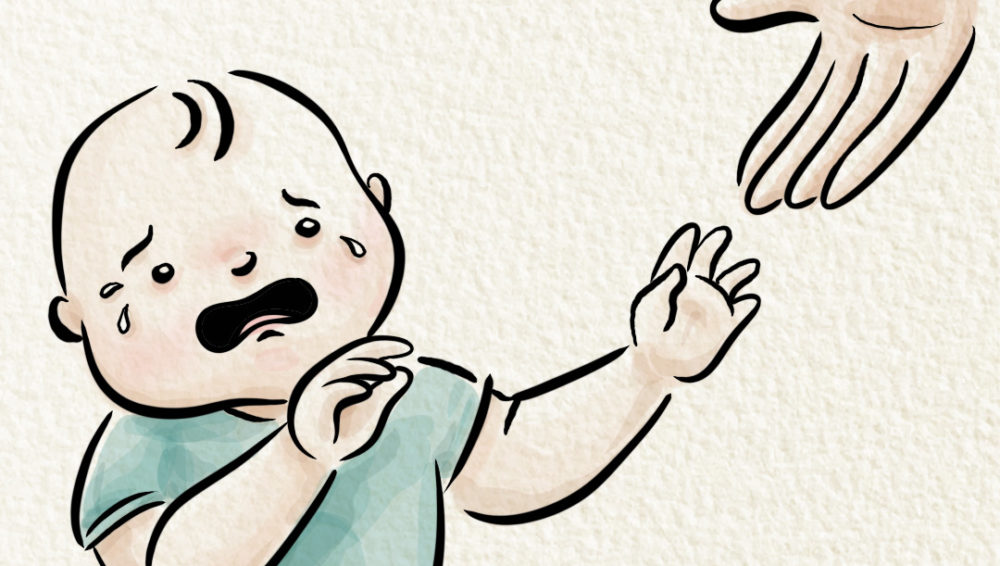Month 7: Understanding separation anxiety

As babies learn that they are separate entities from others, they may temporarily become anxious when meeting strangers.
On the other hand, they now love to interact with those they are familiar with.
How are you and your baby
Your baby may be beginning to manifest the temperament and unique character. Foods that were once the to-go choice might not be it anymore as your child learns about their own preferences and choices.
Your Child’s communication is becoming clearer and more purposeful — for example, shaking the head to say no. The little one may even have a favorite face or place and might recognize familiar words like bath, mama, and dada.
Starting around this age, children may experience several phases of anxiety resulting from fears of strangers or being separated from you or other primary caregivers. For example, you may feel that Your Child has become more clingy than usual, especially when meeting new people or in a new environment. In fact, the little one may insist on joining you in the bathroom rather than have you being far away. And Your Child may have disrupted sleep patterns, such as shorter naps or frequent night waking. If you understand the importance of this phase, you can support your child’s needs and feel more in control. Knowing how to deal with this phase is also good for your sanity.
What is separation anxiety
Separation anxiety is a situation where a child becomes anxious when they are separated from their primary caregiver. This behavior stems from cognitive development — as the child begins to learn about object permanence and starts forming a secure attachment with the parents and other caregivers. At this stage, the child is beginning to understand that objects can still exist even though they are out of sight. So, when Your Child has to be away from you, the little one may be more clingy than usual because they are afraid you might not come back.
Similarly, stranger anxiety is when a child becomes nervous when meeting unfamiliar faces. This uneasiness around new people or environments becomes very prominent during this stage of cognitive development as your child forms a secure attachment with you.
How to teach your child to cope with separation anxiety
Help them learn about object permanence: An effective play that helps children familiarize themselves with object permanence is peekaboo. Hiding a favorite toy or even yourself behind a wall and popping out again shows your child that even though something is out of sight, it still exists and will not be gone forever. In fact, it helps Your Child to build the memory necessary to know that if you leave, you will come back.
Practice greeting and waving: Practice saying goodbye when you leave. Greeting Your Child with a warm hug and smile helps prepare the little one for getting used to being apart from you. The child will associate a pleasant feeling with your presence and disappearance. Tell Your Child why you are leaving and always promise to come back. Although much easier, try to avoid sneaking out while Your Child is distracted, as this will leave the little one much more fearful of being away from you — mommy might be gone again. Building trust takes time and patience but is crucial to raising a secure and confident child.
Create opportunities to meet new people: Exposing children to different environments and new faces help the little one understand that the world is so interesting and safe. Support Your Child by being available for hugs. Also, using comforting words and facial expressions can significantly help ease the anxiety.
Support of your child during separation anxiety
How children perceive and trust the world depends on their relationship with their caregivers. Being supportive and patient during this stage of discovering the outside world is crucial to Your Child’s social upbringing and the ability to form relationships in the future.
If Your Child feels safe when going through a scary time, the little one is more likely to trust and be open to new relationships.
On the other hand, being forced into a relationship too soon or being neglected, can put children constantly on guard, which may cause them to close themselves to the world. As adults, we want to help children cultivate an ability to establish healthy relationships with others, which is important in aiding their transition to life at school when they are older.
Verified:
Dr. Ketsupa Jirakarn (Mental health specialist) (18 February 2022)



